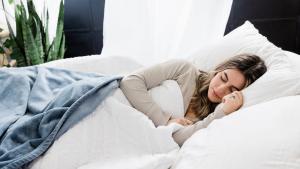
¡No te recomiendo la extracción de biopolímeros con liposucción!
En este artículo te explico por qué no te recomiendo la extracción de biopolímeros por liposucción o técnica cerra [...]
Lear MoreEl sueño es un excelente indicador del estado de salud de las personas, ya que existe una estrecha relación entre los patrones, calidad del sueño y el estado general de salud física y psicológica de las personas. El sueño es un factor que también interviene sobre el sistema inmunológico, ya que durante el sueño se segregan diferentes hormonas que intervienen en la regulación del sistema inmune del cuerpo; si existe una privación el sueño, esta respuesta se verá comprometida, generando una disminución en la capacidad de defensa del cuerpo ante agentes nocivos, aumentando así el riesgo de contraer infecciones.
Sleep is fundamentally divided into REM and NREM sleep, which are repeated in four or five cycles per night with intervals of 90-120 minutes.

Sleep is a factor that also influences the immune system.
Sleep patterns will depend on each organism, the environment and the habits of each person, therefore, we will find three types of sleep patterns:
The ideal sleep pattern is 7-8 hours each night, in order to reduce the risk of diseases such as heart disease and stroke, which can occur in people who sleep more than 8 hours. During the NREM sleep phase, there is a decrease in respiratory frequency, hypotonia in the respiratory muscles, and a 2% reduction in oxygen saturation in relation to the saturation when awake.
Since we cannot be aware of the way we breathe when we are asleep, it is essential that during the day we breathe properly and perform breathing exercises to strengthen muscle tone and prevent the reduction in saturation during periods of nighttime sleep is not much compared to people who breathe inadequately.

Sleep hygiene is essential to achieve restful and quality sleep.
Sleep hygiene is essential to achieve a restful and quality sleep, contributing not only in the healing process, but also in the improvement of lymphatic drainage; therefore, the following should be taken into account:

En este artículo te explico por qué no te recomiendo la extracción de biopolímeros por liposucción o técnica cerra [...]
Lear More
El glúteo como artefacto cultural, topología anatómica y signo psicosocial Desde una perspectiva histórico-epistemol [...]
Lear More
Después de una cirugía de extracción de biopolímeros, el cuerpo inicia un proceso de regeneración y reparación de [...]
Lear More
La presencia de biopolímeros en el organismo representa un riesgo progresivo para la salud, esto se debe a que estas su [...]
Lear More
Como experto en extracción de biopolímeros en glúteos, en mi práctica médica hago uso de la Técnica Abierta, puest [...]
Lear More
Cuando se trata de una extracción de biopolímeros en glúteos, el costo de la cirugía no se mide únicamente en una c [...]
Lear MoreYou can contact us through our WhatsApp chat to request more information or schedule your appointments.
WRITE US!